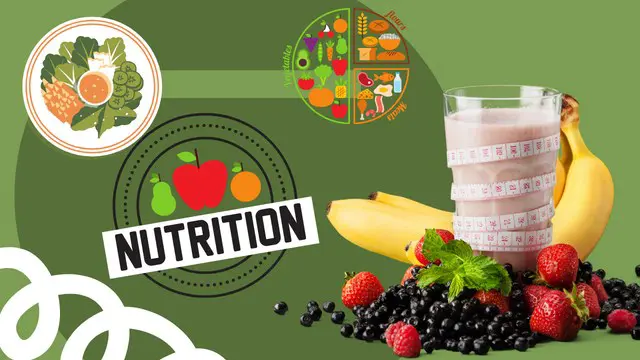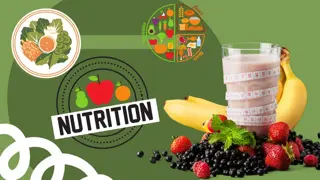
Diploma in Daily Nutrition - CPD Certified
CPD Certified| Free PDF Certificate | Lifetime Access | Learner Support | No Hidden Fees | 100% Success Rate
EDURISE
Summary
- Certificate of completion - Free
- Reed courses certificate of completion - Free
- Tutor is available to students
Add to basket or enquire
Overview
Empower Your Knowledge with Nutrition Education
In a world where health and wellness have taken center stage, the demand for nutrition knowledge is at an all-time high. The field of nutrition is not just a job; it's a business, a career, and a way of life.
Job Demand:
- Data consistently underscores the growing demand for professionals who can provide expert guidance on nutrition, as more people seek to improve their well-being through better dietary choices.
Business Impact:
- In the business world, nutrition plays a crucial role in sectors ranging from food production to healthcare, influencing products, services, and policies.
Career Prospects:
- The field of nutrition offers a diverse range of career prospects, from clinical nutritionists and dietitians to wellness consultants and nutrition educators.
Why You Should Consider This Role:
Health and Wellness Advocacy: As a nutrition professional, you can advocate for healthier living, helping individuals make informed choices to improve their well-being.
Business Opportunities: The nutrition field offers business opportunities, from launching your own health-focused cafe to providing expert nutrition advice and coaching services.
Scientific Foundation: Nutrition is grounded in science, offering a deep understanding of the connection between food, health, and disease prevention.
Personal and Community Impact: Your knowledge and expertise in nutrition can make a significant difference, not just in individual lives but in the community at large.
Continuous Learning: Nutrition is a field of constant discovery and research, providing a dynamic and intellectually stimulating environment for lifelong learners.
Healthy Planet Initiatives: The nutrition field is closely linked to sustainability and environmental awareness, contributing to initiatives for a healthier planet.
Our Nutrition Course equips you with the knowledge and insights needed to understand the principles of nutrition. Whether you're looking to enhance your career, embrace a healthier lifestyle, or explore business opportunities in the realm of nutrition, this course is your pathway to a world of well-being and nutritional expertise.
Free Gift
- Course Completion PDF Certificate
- Tutor Support
Certificates
Certificate of completion
Digital certificate - Included
Reed courses certificate of completion
Digital certificate - Included
Will be downloadable when all lectures have been completed
Curriculum
Course media
Description
Learning Outcomes:
Comprehensive Understanding of Nutrition Fundamentals:
- Develop a comprehensive understanding of the fundamental principles and concepts of nutrition, including macronutrients and micronutrients, to make informed dietary choices.
Knowledge of Food Habits and Dietary Patterns:
- Gain insights into the cultural, societal, and individual factors that influence food habits, enabling you to assess and address dietary patterns.
Expertise in Proteins and Health:
- Acquire expertise in the role of proteins in maintaining health and well-being, understanding their importance in various physiological processes.
Proficiency in Vitamins and Minerals for Health:
- Master the knowledge of essential vitamins and minerals, their functions in the body, and their contribution to overall health and disease prevention.
Understanding of Nutrition Across the Lifespan:
- Gain an understanding of how nutritional requirements change across the lifespan, from infancy to old age, and how to tailor dietary recommendations accordingly.
Module Descriptions:
Introduction to Nutrition:
- Module 01 serves as an introduction to the field of nutrition, providing a foundational understanding of its significance in health and well-being.
Food Habits:
- Module 02 explores the diverse factors that shape food habits, including culture, environment, and personal preferences, and their impact on dietary choices.
Proteins and Health:
- Module 03 focuses on the role of proteins in health, covering their functions, sources, and the implications of protein intake on overall well-being.
Vitamins and Health:
- In Module 04, you'll delve into essential vitamins, their benefits for health, and the consequences of deficiencies, emphasizing the importance of a well-rounded diet.
Minerals, Water, and Body Processes:
- Module 05 covers the significance of minerals and water in various physiological processes, elucidating their role in maintaining bodily functions.
Nutrition and the Life Cycle:
- Module 06 explores the nutritional needs and challenges at different stages of life, from infancy to old age, emphasizing the importance of age-appropriate dietary guidance.
Drugs and Nutrition:
- Module 07 delves into the interaction between drugs and nutrition, highlighting the impact of medications on dietary requirements and vice versa.
Keto Diet:
- Module 08 provides insights into the popular keto diet, explaining its principles, potential benefits, and considerations for those considering this dietary approach.
Nutrition and Women’s Lifestyle:
- Module 09 focuses on the nutritional needs and considerations specific to women's lifestyles, including pregnancy, breastfeeding, and menopause.
Role of a Nutritionist:
- The final module, Module 10, explores the role of a nutritionist, offering insights into the responsibilities and skills required to pursue a career in nutrition.
This course equips you with a profound understanding of nutrition, from the basics of macronutrients and micronutrients to the complexities of dietary patterns, drug interactions, and dietary needs across the lifespan. It also provides insights into specific dietary approaches and the potential roles of nutritionists in the field.
Certificate of Completion
After completing the Nutrition: Nutrition diploma course, you will be able to obtain your free PDF certificate of course completion.
Who is this course for?
Ideal Audience for this Course:
Health Enthusiasts:
- Individuals interested in leading a healthy lifestyle and making informed dietary choices to enhance their overall well-being.
Parents and Caregivers:
- Parents and caregivers looking to provide the best nutrition for their families, understanding the impact of food on different life stages.
Students and Researchers:
- Students pursuing degrees in nutrition, dietetics, or related fields, as well as researchers exploring the science of nutrition.
Dietary Counselors and Nutrition Coaches:
- Dietary counselors and nutrition coaches seeking to expand their knowledge and expertise in nutrition to better assist their clients.
Healthcare Professionals:
- Healthcare professionals, such as nurses and doctors, interested in understanding the connection between nutrition and health to provide holistic patient care.
Fitness and Wellness Instructors:
- Fitness trainers and wellness instructors looking to incorporate nutritional knowledge into their coaching to optimize clients' fitness journeys.
Individuals Considering the Keto Diet:
- Those intrigued by the keto diet and its potential benefits, seeking information on its principles, risks, and considerations.
Women's Health and Wellness Advocates:
- Individuals passionate about women's health and wellness, including women's life stages and nutritional needs.
Educators and Teachers:
- Educators and teachers wanting to incorporate nutrition education into their curricula, empowering students with knowledge about making healthy choices.
Community Health Workers:
- Community health workers aiming to enhance the well-being of their communities through nutrition education and support.
Food and Beverage Industry Professionals:
- Professionals in the food and beverage industry interested in understanding dietary trends, consumer preferences, and the impact of nutrition on product development.
This course caters to a wide array of individuals, from health-conscious individuals and parents to professionals in healthcare, fitness, and education. It provides essential knowledge about nutrition, dietary patterns, dietary considerations across the life cycle, and the role of a nutritionist, making it accessible to a diverse audience.
Requirements
The Nutrition: Nutrition course has no formal entry requirements.
Career path
- Nutrition Assistant or Dietary Aide: Entry-level position with a typical UK salary ranging from £18,000 to £25,000 per year.
- Nutritionist or Registered Dietitian: With experience and qualifications, salary can advance to between £26,000 and £45,000 annually.
- Senior Nutritionist or Clinical Dietitian: Experienced professionals in these roles may earn £46,000 to £70,000 or more.
Questions and answers
Currently there are no Q&As for this course. Be the first to ask a question.
Reviews
Currently there are no reviews for this course. Be the first to leave a review.
Legal information
This course is advertised on reed.co.uk by the Course Provider, whose terms and conditions apply. Purchases are made directly from the Course Provider, and as such, content and materials are supplied by the Course Provider directly. Reed is acting as agent and not reseller in relation to this course. Reed's only responsibility is to facilitate your payment for the course. It is your responsibility to review and agree to the Course Provider's terms and conditions and satisfy yourself as to the suitability of the course you intend to purchase. Reed will not have any responsibility for the content of the course and/or associated materials.


